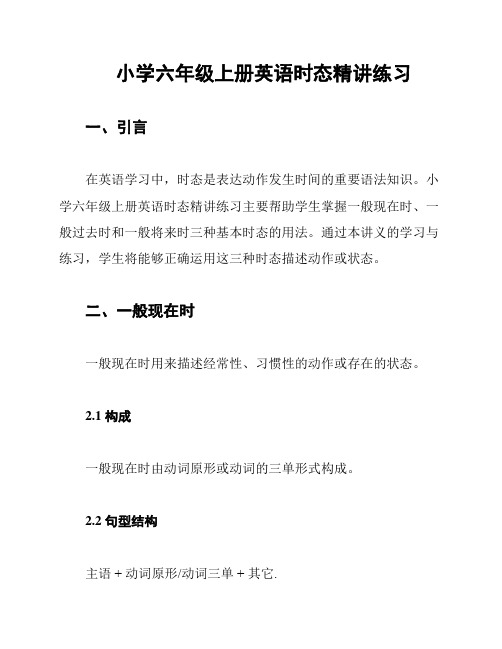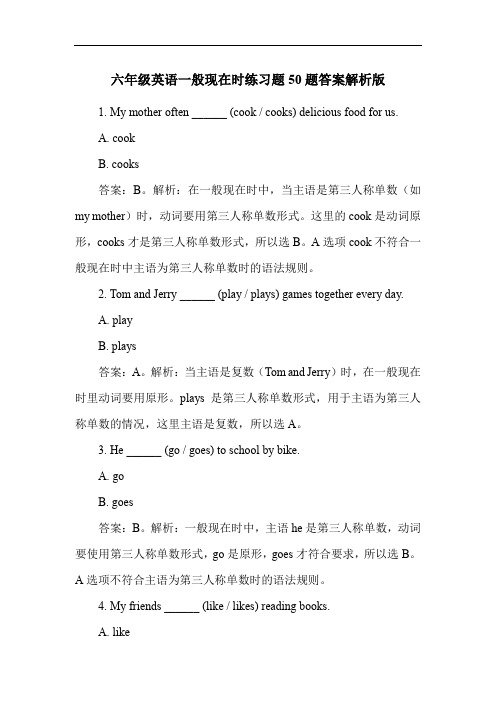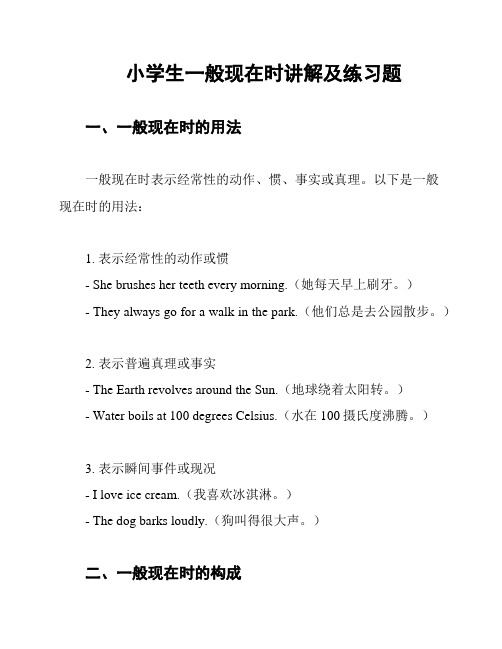六年级英语一般现在时讲解加练习
一般现在时用法及专项练习

一般现在时(the simple present tense)一、定义是一种英语语法形式,表示规律性、通常性、习惯性、真理性的动作或状态。
二、结构(一)肯定句1. 主语 + be 动词(am/is/are)+ 其他。
例如:I am a student.(我是一名学生。
)2. 主语 + 动词原形。
例如:We play basketball on weekends.(我们在周末打篮球。
)3.主语(第三人称单数)+动词第三人称单数形式。
一般在动词词尾加 -s 或 -es。
例如:He plays football after school.(他放学后踢足球。
)Tom usually goes to school at 7:30.(汤姆通常7点半去学校。
)(二)否定句1. 主语 + be 动词(am/is/are)not +其他。
例如:I am not a student.(我不是一名学生。
)2. 主语 + do not(don’t) +动词原形。
例如:We do not play basketball on weekends.(我们周末不打篮球。
)3.主语(第三人称单数)does not(doesn’t )+动词原形。
例如:He does not play football after school.(他放学后不踢足球。
)(三)一般疑问句1. Be动词+主语+其他?例如:Is she a student?(她是学生吗?)2. Do/Does + 主语 + 动词原形?例如:Do you play football after school? (你放学后踢足球吗?)Does he work here? (他在这里工作吗?)三、用法1. 描述习惯或重复动作:常与表示频率的时间状语连用。
例如:I get up at 6 o'clock every morning. (我每天早上六点起床。
)He goes to school by bus. (他乘公共汽车上学。
六年级下册英语 一般现在时语法详解 练习(word,含答案) 译林版

一般现在时态一、一般现在时的定义一般现在时表示现在经常反复发生的动作,存在的状态或习惯性的动作的时态。
二、一般现在时的结构一般现在时用行为动词的原形,但第三人称单数作主语时,动词的词尾要加-s 或- es。
现在以连系动词be 和行为动词read为例,对一般现在时的肯定句、否定句、疑连系动词be 的各种形式常与代词或not缩写成一个词。
助动词do,does 一般只有与not 缩写。
联系动词be缩写形式如下动词do not 的缩写形式为don’t,does not 的缩写形式为doesn’t。
三、动词加-s 或-es (动词第三人称单数)当主语是第三人称单数时,谓语动词需加-s 或-es1.一般在词尾加–s例:work—works leave --- leaves swim --- swims2.以字母s,x,ch,sh 或o结尾的词加-es例:pass--- passes fix ---fixes teach --- teaches do--- does 3.以辅音字母加y结尾的词,先变y为i再加-es例:study --- studies carry --- carries fly --- flies cry --- cries 四、一般现在时的用法4.表示经常或习惯性的动作。
常与often(经常), always(总是), sometimes (有时), every day(每天), on Sundays/Mondays 等表示频度的时间状语连用。
一般现在时的时间状语有:today, often, sometimes, always, usually, every day ( week, month, year,…) , this year, once a week ( month, year,…) 一周(月,年)一次例句:I get up at 6 o’clock every day.He often goes to school by bike.5.表示客观事实,普遍真理。
小学六年级上册英语时态精讲练习

小学六年级上册英语时态精讲练习一、引言在英语学习中,时态是表达动作发生时间的重要语法知识。
小学六年级上册英语时态精讲练习主要帮助学生掌握一般现在时、一般过去时和一般将来时三种基本时态的用法。
通过本讲义的学习与练习,学生将能够正确运用这三种时态描述动作或状态。
二、一般现在时一般现在时用来描述经常性、习惯性的动作或存在的状态。
2.1 构成一般现在时由动词原形或动词的三单形式构成。
2.2 句型结构主语 + 动词原形/动词三单 + 其它.2.3 练习1. I (eat)_____ breakfast every morning.2. She (go)_____ to school by bus.3. The cat (sleep)_____ on the sofa.三、一般过去时一般过去时用来描述过去发生的动作或存在的状态。
3.1 构成一般过去时由动词的过去式构成。
3.2 句型结构主语 + 动词过去式 + 其它.3.3 练习1. I (watch)_____ a movie yesterday.2. She (visit)_____ her grandparents last week.3. They (play)_____ soccer in the park.四、一般将来时一般将来时用来描述将来要发生的动作或存在的状态。
4.1 构成一般将来时有两种构成方式:will + 动词原形和 be going to + 动词原形。
4.2 句型结构1. 主语 + will + 动词原形 + 其它.2. 主语 + be going to + 动词原形 + 其它.4.3 练习1. I (buy)_____ a new bike next month.2. She (travel)_____ to Japan with her family.3. They (move)_____ to a new house in two years.五、总结通过本讲义的学习与练习,学生应掌握一般现在时、一般过去时和一般将来时三种基本时态的构成、句型结构和用法。
六年级英语一般现在时练习题50题(答案解析)

六年级英语一般现在时练习题50题(答案解析)1.She ______ to school by bus every day.A.goB.goesC.goingD.to go答案解析:B。
本题考查一般现在时,主语是she,第三人称单数,动词要用goes。
一般现在时中,当主语是第三人称单数时,动词要发生变化,通常在动词后加s 或es。
A 选项go 是原形,主语不是第三人称单数时使用;C 选项going 是现在分词,不能单独作谓语;D 选项to go 是动词不定式,也不能单独作谓语。
2.He ______ football after school.A.playB.playsC.playingD.to play答案解析:B。
主语是he,第三人称单数,动词用plays。
一般现在时中第三人称单数动词变化规则如前所述。
A 选项play 是原形;C 选项playing 是现在分词;D 选项to play 是动词不定式。
3.They ______ homework in the evening.A.doB.doesD.to do答案解析:A。
主语是they,不是第三人称单数,动词用原形do。
B 选项does 是第三人称单数形式;C 选项doing 是现在分词;D 选项to do 是动词不定式。
4.My mother ______ cooking every day.A.likeB.likesC.likingD.to like答案解析:B。
主语是my mother,第三人称单数,动词用likes。
A 选项like 是原形;C 选项liking 是现在分词;D 选项to like 是动词不定式。
5.We ______ books in the library on weekends.A.readB.readsC.readingD.to read答案解析:A。
主语是we,不是第三人称单数,动词用原形read。
B 选项reads 是第三人称单数形式;C 选项reading 是现在分词;D 选项to read 是动词不定式。
小升初语法辨析一般现在时一般过去时一般将来时(讲义)人教PEP版英语六年级下册

小升初英语语法辨析:一般现在时、一般过去时、一般将来时&专项模拟练习一、一般现在时1.定义:表示经常发生的动作、存在的状态或普遍真理。
2.时间标志词:often(经常)、usually(通常)、always(总是)、sometimes(有时)、every day/week/month/year(每天/ 周/ 月/ 年)等。
3.结构:1.主语(非第三人称单数)+ 动词原形。
例如:You play basketball afterschool.(你放学后打篮球。
)2.主语(第三人称单数)+ 动词的第三人称单数形式。
例如:He playsbasketball after school.(他放学后打篮球。
)4.用法:1.表示经常性或习惯性的动作。
如:I go to school by bike every day.(我每天骑自行车去上学。
)2.表示现在的状态或特征。
如:She is tall and thin.(她又高又瘦。
)3.表示客观事实或普遍真理。
如:The earth moves around the sun.(地球绕着太阳转。
)二、一般过去时1.定义:表示过去某个时间发生的动作或存在的状态。
2.时间标志词:yesterday(昨天)、last week/month/year(上周/ 上个月/ 去年)、ago(……以前)、in + 过去的年份等。
3.结构:主语+ 动词的过去式。
例如:You played basketball yesterday.(你昨天打了篮球。
)4.用法:1.表示过去某个时间发生的动作。
如:I went to the park last Sunday.(我上周日去了公园。
)2.表示过去存在的状态。
如:He was happy yesterday.(他昨天很开心。
)三、一般将来时1.定义:表示将来某个时间要发生的动作或存在的状态。
2.时间标志词:tomorrow(明天)、next week/month/year(下周/ 下个月/ 明年)、in the future(在未来)等。
六年级英语一般现在时练习题50题答案解析版

六年级英语一般现在时练习题50题答案解析版1. My mother often ______ (cook / cooks) delicious food for us.A. cookB. cooks答案:B。
解析:在一般现在时中,当主语是第三人称单数(如my mother)时,动词要用第三人称单数形式。
这里的cook是动词原形,cooks才是第三人称单数形式,所以选B。
A选项cook不符合一般现在时中主语为第三人称单数时的语法规则。
2. Tom and Jerry ______ (play / plays) games together every day.A. playB. plays答案:A。
解析:当主语是复数((Tom and Jerry)时,在一般现在时里动词要用原形。
plays是第三人称单数形式,用于主语为第三人称单数的情况,这里主语是复数,所以选A。
3. He ______ (go / goes) to school by bike.A. goB. goes答案:B。
解析:一般现在时中,主语he是第三人称单数,动词要使用第三人称单数形式,go是原形,goes才符合要求,所以选B。
A选项不符合主语为第三人称单数时的语法规则。
4. My friends ______ (like / likes) reading books.A. like答案:A。
解析:因为主语my friends是复数,在一般现在时里,复数主语后的动词用原形。
likes是第三人称单数形式,用于单数主语,所以选A。
5. She ______ (watch / watches) TV in the evening.A. watchB. watches答案:B。
解析:一般现在时中,主语she是第三人称单数,动词要用第三人称单数形式,watch是原形,watches符合,所以选B。
A选项不符合语法规则。
6. We ______ (have / has) English lessons on Monday.A. haveB. has答案:A。
一般现在时知识讲解与专项练习(讲义)-人教PEP版英语六年级上册

六年级上册一般现在时知识讲解与专项练习一、一般现在时知识点【No. 1】概念:1.表不事物或人物的特征、状态。
如:The sky is blue.天空是蓝色的。
2.表示经常性或习惯性的动作。
如:I get up at six every day.我每天六点起床。
3.表示客观现实。
如:The earth goes around the sun.地球绕着太阳转。
【No.2】时间标志性词:every ... (every day/week/Sunday...)on+星期几(on Mondays/Tuesdays..)频度副词(always, usually often sometimes, rarely, seldom, never)【No.3】结构:①动词原形I like apples.②动词单三形式He plays football.③be动词I am a boy.有be无动(动:实义动词)①肯定句:主语+be+其他He is an English teacher.②否定句:主语+be not+其他He is not an English teacher.③一般疑问句:Be +主语+其他+...?Is he an English teacher?有动无be(动:实义动词)①肯定句:主语(非三单)+动词原形+其他I play football.主语(三单)+动词三单形式+其他He plays football.②否定句:主语(非三单)+don’t+动词原形+其他I don't play football.主语(三单)+doesn’t动词原形+其他He doesn't play football.③一般疑问句:Do+主语(非三单)+动词原形+其他?Do you play football?Does+主语(三单)+动词原形+其他?①肯定形式:主语十情态动词can/may+动词原形+宾语。
小学生一般现在时讲解及练习题

小学生一般现在时讲解及练习题一、一般现在时的用法一般现在时表示经常性的动作、惯、事实或真理。
以下是一般现在时的用法:1. 表示经常性的动作或惯- She brushes her teeth every morning.(她每天早上刷牙。
)- They always go for a walk in the park.(他们总是去公园散步。
)2. 表示普遍真理或事实- The Earth revolves around the Sun.(地球绕着太阳转。
)- Water boils at 100 degrees Celsius.(水在100摄氏度沸腾。
)3. 表示瞬间事件或现况- I love ice cream.(我喜欢冰淇淋。
)- The dog barks loudly.(狗叫得很大声。
)二、一般现在时的构成在一般现在时中,动词的变化相对简单。
1. 对于第三人称单数(He/She/It),动词要加-s或-es。
- He walks to school every day.(他每天走路去学校。
)- She eats an apple.(她吃一个苹果。
)- It runs fast.(它跑得很快。
)2. 对于其他人称(I/You/We/They),动词不变。
- I play soccer on weekends.(我周末踢足球。
)- You read books every night.(你每晚读书。
)- We go swimming in summer.(我们夏天去游泳。
)- They watch movies together.(他们一起看电影。
)三、练题请根据句意填入正确的动词形式。
1. My mother __________ (cook) dinner for us every evening.2. Tom and Lisa __________ (play) tennis on Saturdays.3. The sun __________ (rise) in the east.4. We __________ (study) English at school.5. Dogs __________ (bark) when they see strangers.1. cooks2. play3. rises4. study5. bark希望以上讲解和练习题对你有帮助!。
- 1、下载文档前请自行甄别文档内容的完整性,平台不提供额外的编辑、内容补充、找答案等附加服务。
- 2、"仅部分预览"的文档,不可在线预览部分如存在完整性等问题,可反馈申请退款(可完整预览的文档不适用该条件!)。
- 3、如文档侵犯您的权益,请联系客服反馈,我们会尽快为您处理(人工客服工作时间:9:00-18:30)。
一般现在时一般现在时的定义:表示经常性的事情,经常性的动作或一般性事实。
一般现在时的标志词:often 经常,usually通常,always 总是,every每个,sometimes 有时一般现在时的结构:只有在主语是第三人称单数时动词发生“三单变化”,其他用动词的原形。
三单变化:1.多数在动词后+s play — plays like — likes(1)直接在动词词尾加-s.ask---asks work---works get---gets stay---stays(2)以字母s, x, ch, sh或o结尾的动词,在词尾直接加-es.watch---watches wish---wishes fix---fixes do---doesgo---goes pass---passes(3)以“辅音字母加- y”结尾的动词,要先变y为i再加-es.try---tries study---studies cry---cries fly---flies2.不规则变化:be---- is are have----has二、一般现在时用法1. 表示经常性,习惯性,永久性的动作或存在的状态.通常与副词sometimes, often, usually, always, every day (year, month ), once (twice, three times) a day,等时间状语连用。
They usually go to school by bike.I take the medicine three times a day.She helps her mother once a week.Mary’s father is a policeman.There are 50 students in my class.2. 表示客观真理,科学原理,自然现象,等客观事实或格言,谚语等。
The sun rises in the east and sets in the west every day.The man who has never been to the Great Wall is not a real man.Tomorrow is Tuesday.三、一般现在时的句子转换:(1)当句子中有be动词或情态动词时,则把be动词或情态动词(can,could 等等)提到主语的前面变成疑问句;在be动词或情态动词后面加not变成否定句.例:①陈述句:She is a student.疑问句→ Is she a student?否定句→ She is not a student.①陈述句:I can swim.疑问句→ Can you swim否定句→ I can not swim.(2)当句子中即没有be动词,也没有情态动词时,则在主语前加助动词do (you,以及复数), does(单数she,he,it)变成问句;在主语后谓语动词前加助动词don’t(I,you,以及复数), doesn’t(单数she,he,it)变成否定句,助动词后的动词要变成动词原形。
例:①陈述句:We get up at 7:00 every morning.疑问句→Do you get up at 7:00 every morning?否定句→We don’t get up at 7:00 every morning.①陈述句:She has a little brother.疑问句→ Does she have a little brother?否定句→ She doesn’t have a little brother.(一).用动词的适当形式填空1. She _________(go) to school at seven o’clock.2. He usually ___________ up at 17:00.(get )3. She ___________ (live) in Beijing.4. My father __________ (watch) TV every evening.5.________ Amy _________ (read) English every day?6. Chen Jie sometimes _________(go)to the park with her sister.(二).选择填空7.I want____homework now. A. doing B. to do C. to do my D. do my 8.It's time______.A. go to schoolB. play gamesC. to go homeD. to do my homework 9.______go and help her. A. Let's me B. Let's us C. Let's D. Let's to 10.Do they have a new car? Yes,_____.A .they are B.they have C. they don't D. they do11.He often _________ supper at 6:00 in the evening.A. haveB. has c. is having D. is eating12. We _____________ any Chinese classes on Friday.A. are havingB. aren’t havingC. don’t haveD. are have(三)、用括号内动词的适当形式填空。
13. He often _________ (have) dinner at home.14. Daniel and Tommy _________ (be) in Class One.15. We _________ (not watch) TV on Monday.16. Nick_________ (not go) to the zoo on Sunday.17. _________they _________ (like) the World Cup?18. What _________ they often_________ (do) on Saturdays?19. _________your parents _________ (read) newspapers every day?20. The girl _________ (teach) us English on Sundays.21. She and I _________ (take) a walk together every evening.22. There _________ (be) some water in the bottle.23. Mike_________ (like) cooking.24. They _________ (have) the same hobby.25. My aunt _________ (look) after her baby carefully.26. You always _________ (do) your homework well.27. I _________ (be) ill. I’m staying in bed.28. She _________ (go) to school from Monday to Friday.29. Liu Tao _________ (do) not like PE.30. The child often _________ (watch) TV in the evening.31. Wang Kai and Wang li_________ (have) eight lessons this term.32. -What day _________ (be) it today?-It’s Saturday.33.We often___________(play) in the playgound.34.He _________(get) up at six o’clock.35. __________you _________(brush) your teeth every morning.36. What __________(do) he usually _________ (do) after school?37. Danny__________(study) English,Chinese,Maths,Science and Art an school.38. Mike sometimes __________(go) to the park with his sister39. At eight at night, she __________(watch) TV with his parents.40. ________ Mike________(read) English every day?41. How many lessons_________your classmate________(have) on Monday?42.What time_________his mother_________(do) the housework?43. Do you often play football after school? (肯定回答)______________________________________________________44. I have many books.(改为否定句)______________________________________________________45. Gao Shan’s sister likes playing table tennis (改为否定句)______________________________________________________46. She lives in a small town near New York.(改为一般疑问句)______________________________________________________47. I watch TV every day. (改为一般疑问句)______________________________________________________48. David has got a goal. (改为一般疑问句)______________________________________________________49. We have four lessons.(否定句)______________________________________________________50. Nancy doesn’t run fast (肯定句)______________________________________________________51.My dog runs fast.一般疑问句:__________________________________________否定句:__________________________________________52.Mike has two letters for him.一般疑问句:__________________________________________否定句:__________________________________________53.I usually play football on Friday afternoon.否定句:__________________________________________一般疑问句:__________________________________________划线提问:__________________________________________ 54.Su Yang usually washes some clothes on Saturday.否定句:__________________________________________一般疑问句:__________________________________________划线提问:__________________________________________ 55.Mingming usually waters the flowers every day否定句:__________________________________________一般疑问句:__________________________________________划线提问__________________________________________ 56.Tom does his homework at home.否定句:__________________________________________一般疑问句:__________________________________________划线提问__________________________________________。
